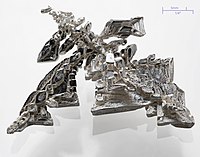
Photo from wikipedia
The synthesis and biological evaluation of 5-arylidene-N-acetyl-tetramic acids cadmium(II) complexes are reported. Eleven novel compounds were prepared, characterized by nuclear magnetic resonance experiments and screened for their antimicrobial activity against… Click to show full abstract
The synthesis and biological evaluation of 5-arylidene-N-acetyl-tetramic acids cadmium(II) complexes are reported. Eleven novel compounds were prepared, characterized by nuclear magnetic resonance experiments and screened for their antimicrobial activity against five bacterial species (Escherichia coli, Klebsiella pneumoniae, Acinetobacter baumannii, Pseudomonas aeruginosa, and methicillin-resistant Staphylococcus aureus [MRSA]) and two fungi (Candida albicans and Cryptococcus neoformans). The complexes showed similar or enhanced activities against MRSA in comparison to the corresponding ligands and, additionally, promising antifungal activities against C. neoformans. The most active compounds 3c and 3h showed remarkable activities against MRSA (minimum inhibitory activity [MIC] values of 32 and 4 μg/ml, respectively) and C. neoformans (MIC values of 8 and 16 μg/ml, respectively), accompanied by no human cell toxicity and hemolytic activity within the tested concentration range. The results demonstrate that appropriately functionalized tetramic acids attached with lipophilic alkanoyl chain and after complexation with cadmium(II) ions may act as valuable lead compounds for further investigations toward the development of novel antibacterial and/or antifungal agents.
Journal Title: Archiv der Pharmazie
Year Published: 2021
Link to full text (if available)
Share on Social Media: Sign Up to like & get
recommendations!